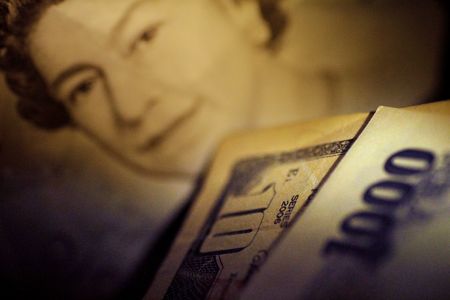 1
1 1
1

By Saqib Iqbal Ahmed
NEW YORK (Reuters) -The U.S. dollar tumbled against the yen on Friday, logging its biggest daily drop against the Japanese currency in more than two months as traders and strategists said Japanese authorities may be in the market to stem a slide in their battered currency.
The yen rose as high as 144.5 per dollar on Friday, before paring gains to trade up about 1.4% at 148.195, its biggest daily jump since August 10.
“I think it’s intervention,” Karl Schamotta, chief market strategist, at Corpay in Toronto, said.
“We are seeing lots of dollar selling and the yen moving almost vertically as shorts get squeezed,” he said.
The Japanese government and the Bank of Japan conducted yen-buying, dollar-selling intervention in the foreign exchange market, the Nikkei newspaper said early on Saturday, citing a source.
Japan’s Ministry of Finance declined to comment on the matter.
“It’s very clearly the Ministry of Finance stepping in to sell dollar-yen,” said Mazen Issa, senior FX strategist at TD Securities in New York.
“They are trying to staunchly defend their very easy policy,” he said.
“A lot of folks had been looking at 150 as a key level that they would see some kind of intervention, and they let it run through to basically 152 and then the timing of their intervention happened at a very illiquid time, basically, as London was about to head home for the weekend, and it seems like it is designed to inflict as much pain as possible on, they like to use the term, speculators,” Issa said.
Earlier on Friday, Japanese finance minister Shunichi Suzuki said authorities were dealing with currency speculators “strictly”, while Bank of Japan governor Haruhiko Kuroda said the central bank would closely watch the impact of currency moves.
With Friday’s gains, the yen was on track to snap a nine-week streak of weekly losses against the greenback.
The dollar index, which measures the greenback’s strength against a basket of currencies, was 0.7% lower at 112.17, down from a three-week high of 113.95, hit during the session.
The greenback came under pressure after a report said some Fed officials have signalled greater unease with big interest rate rises to fight inflation, even as they line up another big rate hike for November.
The Wall Street Journal reported that Fed officials are barrelling toward another interest-rate rise of 0.75 percentage point at their November meeting, while some policymakers have begun signalling their desire to slow down the pace of increases soon.
Fed officials are likely to debate then whether and how to signal plans to approve a smaller increase in December, the report said.
The dollar has risen strongly this year helped by the Federal Reserve’s hawkish stance and robust demand for safe havens amid continuing uncertainty about the outlook for the global economy gripped by inflation.
Despite its retreat on the Fed headlines, the dollar index remains near a two decade high.
“It’s really hard to bet against the fact that the Fed is going to need to continue to be quite aggressive in its approach going forward,” said Bipan Rai, North American head of FX strategy at CIBC Capital Markets.
“That ultimately means we still see dollar upside,” Rai said.
The weakness in the dollar helped lift sterling 0.2% to $1.1261, even as the outlook for the pound remained murky as Britain’s ruling Conservative party gets set to pick the country’s third prime minister in two months after Liz Truss quit on Thursday.
The currency had leapt as much as 1% the previous day after Truss announced her departure.
(Reporting by Saqib Iqbal Ahmed; Additional reporting by John McCrank and Dhara Ranasinghe; Editing by David Gregorio, Kirsten Donovan)